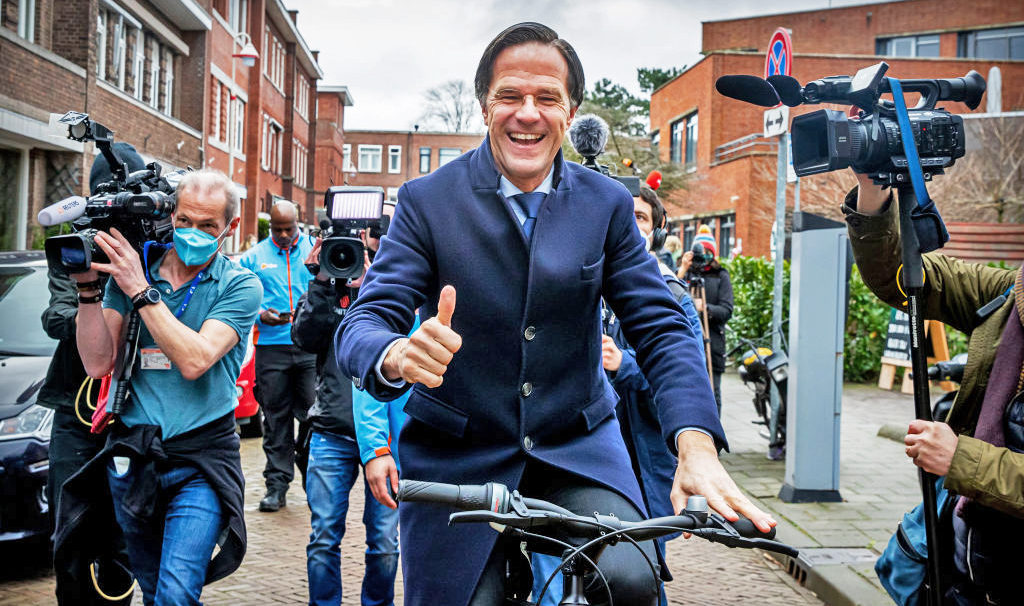Congratulations to Mark Rutte! He’s just won a fourth successive election victory and a fourth term as Prime Minister of the Netherlands. When Angela Merkel steps down later this year, Rutte will be Europe’s senior statesman.
And yet his latest victory may prove to be a hollow one.
To understand why, it helps to remember that Dutch politics is mad. That’s not a reflection on the Dutch people, but rather a consequence of an overly proportional electoral system. The share of the vote required to get a seat is less than 1% — this makes for an ever-lengthening list of parliamentary political parties.
The Dutch House of Representatives only has 150 seats, but this time they’re likely to be divided 17 ways.
The choice on offer is lavish. For instance, there are not one but two Green parties — the Green Left and the Party for the Animals (which has several seats despite Dutch animals not having the vote yet). Furthermore, as well as the Christian Democrats, there’s also the more overtly religious Christian Union and the uncompromisingly Calvinist SGP.
Right-wing populists also have a choice of three: Geert Wilders’ PVV, Thierry Baudet’s FvD and a breakaway faction from the FvD called JA21.
Other voter options include the Socialist Party, a pensioners’ party and a farmers’ party (who I hope won’t do anything untoward to the animals’ party).
Imagine forming a stable coalition out of that lot!
The third Rutte government was a coalition of four parties — Rutte’s own party, the VVD (conservative liberals); D66 (liberal liberals); the Christian Democrats and the Christian Union. It would make sense to get the gang together again for a fourth Rutte government, but there’s a catch.
The liberal liberals did rather well this time and the Christian Democrats rather badly. The latter may feel duty-bound to take themselves off into opposition, while the former might wish to kick out the socially conservative Christian Union and replace them with one or more parties of the Left. The trouble with that is that the Left-wing parties — especially the Socialists and the Green Left — got a pasting this time round. They’ll be in no mood to prop-up a Rutte administration.
Over on the Right, the populist parties gained seats over all, but the two liberal parties won’t want to get into bed with that lot. Rutte has tried that once already and it didn’t go well.
The situation leaves the VVD and D66 scrabbling around for junior coalition partners. Potential candidates include the once mighty, but now much diminished, Labour Party. There’s also Volt — a new group of EU super-fans. However, Rutte has reason to be wary of leading a distinctly pro-Brussels coalition.
In the wake of Brexit, he’s taken on the mantle of Europe’s Mister No — a role traditionally assigned to the British PM. He’s not a Nexiteer, but he is sceptical of further EU integration and decidedly cool on European ‘solidarity’ at Dutch expense.
So far, it’s worked well for him politically — not least in limiting the populist threat from the Right. However, it may have helped to mobilise pro-EU sentiment in the Netherlands, which this time has coalesced around D66 — Rutte’s indispensable (and now more powerful) coalition partner.
In all likelihood, Rutte will cobble together a new coalition — but he may have to sacrifice his already moderate Euroscepticism.











Join the discussion
Join like minded readers that support our journalism by becoming a paid subscriber
To join the discussion in the comments, become a paid subscriber.
Join like minded readers that support our journalism, read unlimited articles and enjoy other subscriber-only benefits.
Subscribe